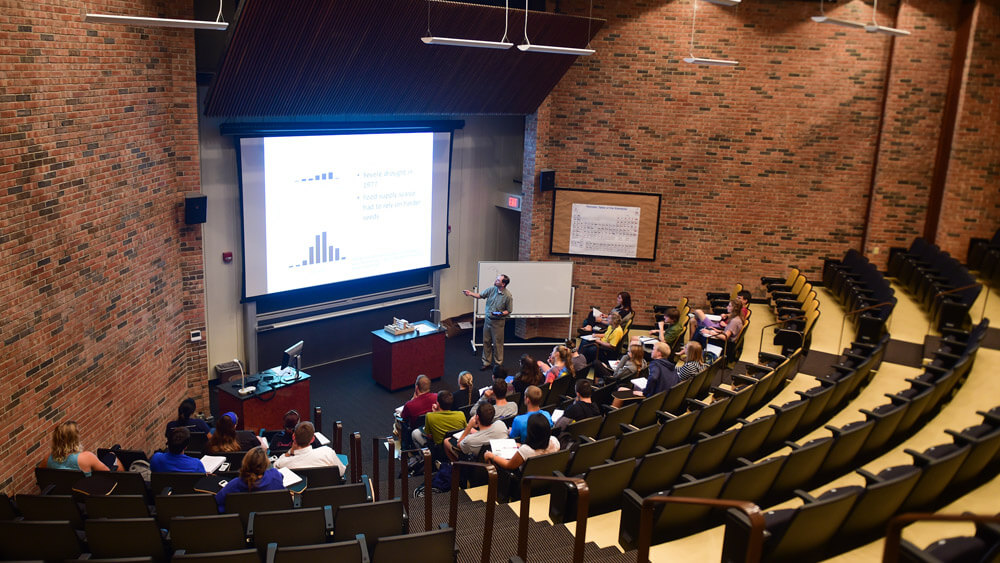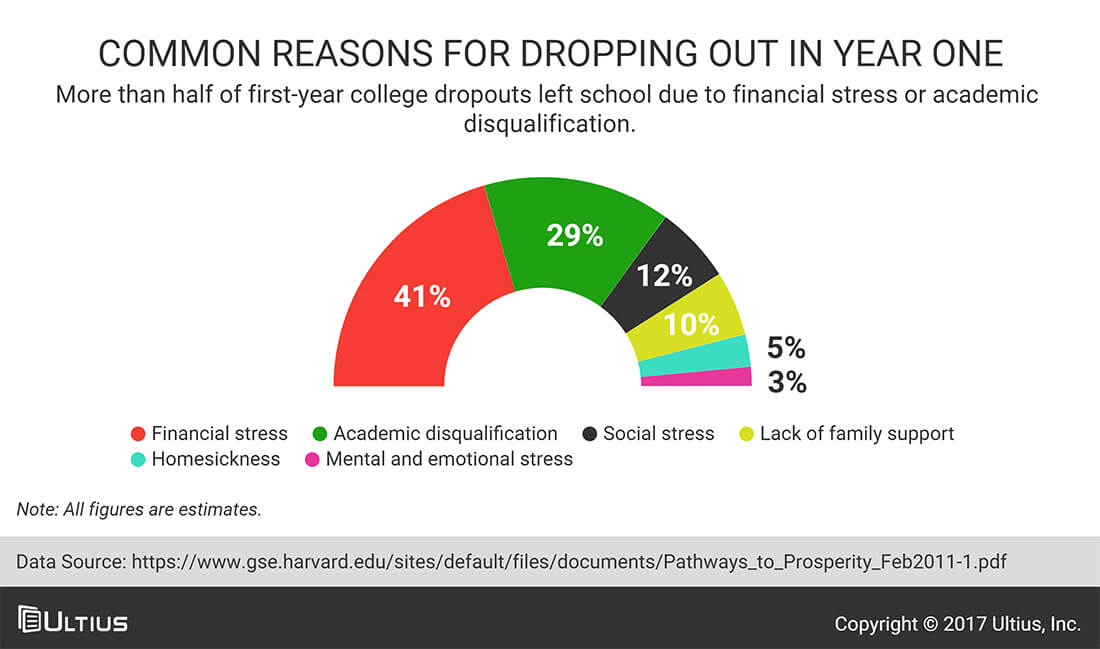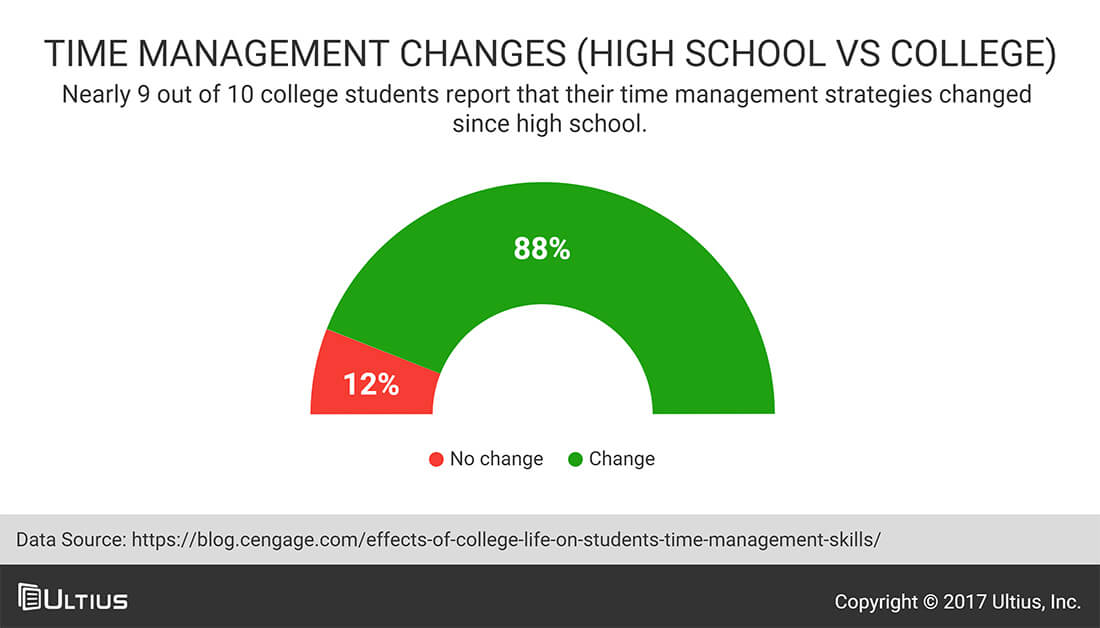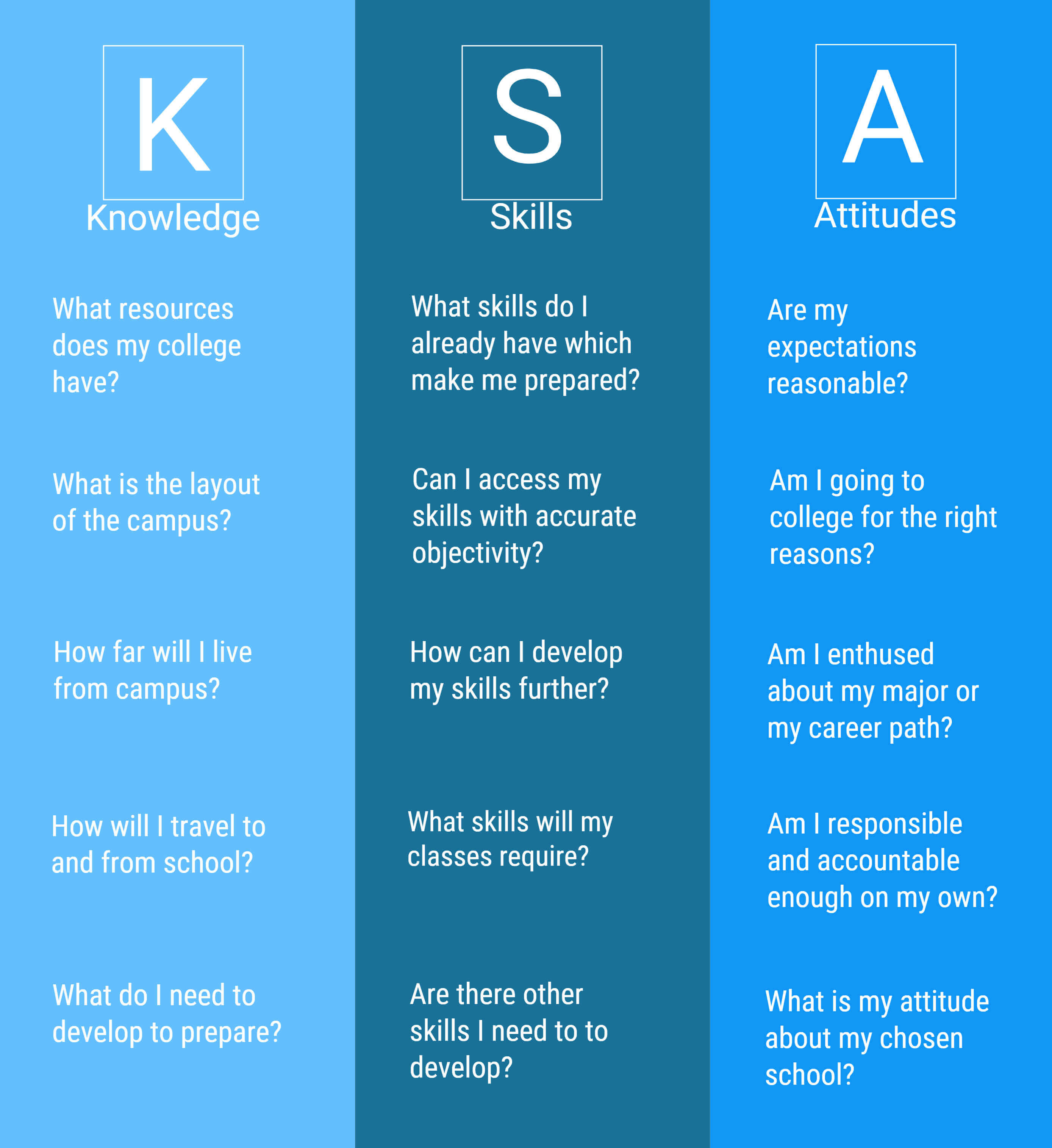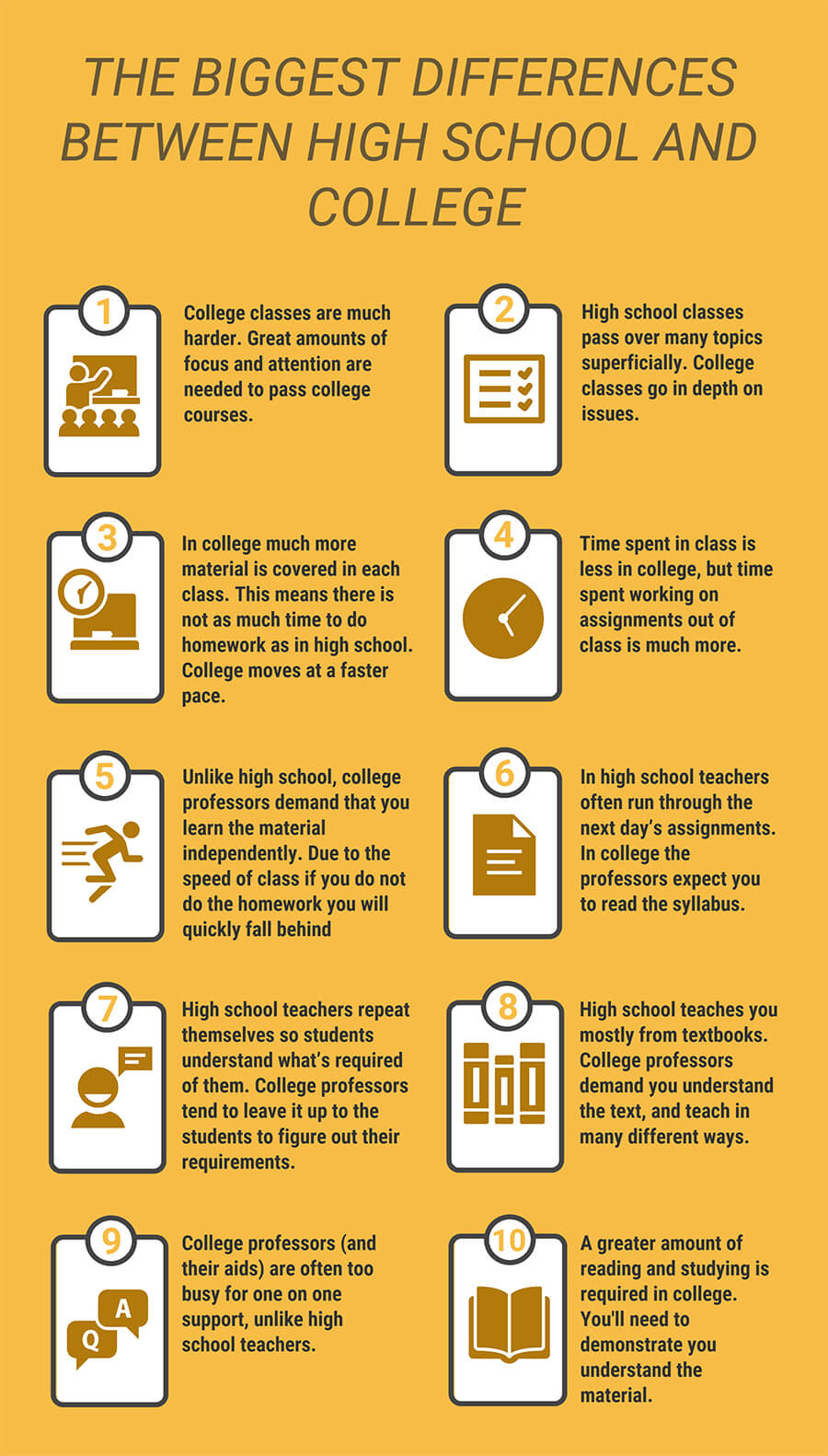Ultius Blog
How to Make an Easy Transition to College From High School
The culture shock factor of transitioning from high school
Making the transition from high school to college can be an exciting period of a young person’s life. It can also be a rude shock resulting in failure if you are unprepared or overconfident.
The phenomenon known as the “freshman myth” in reality, is the lack of realistic expectations and preparation. In 2008, this resulted in 34% of first-year students dropping out.
Recognizing the need to address this problem, many programs have been developed to support first year college students. As a result, first year dropouts have decreased to 5.9 percent in 2015.
There are many differences in the culture, requirements, and type of workloads between high school and college. While first year burnout is an enduring problem there are many ways to prepare and make the best out of the beginnings of your college career.
Important factors when transitioning to college from high school:
- Help from tutors
- Sharing the importance of nutrition
- Consideration of employment and vocation education
- Illustrating the differences between high school and college
- Offering advice on how to avoid becoming overwhelmed
- Give advice on how to create a road map for maximizing your first year
- Suggesting support structures in the college environment
The first year of college has the power to set the tone for the entire collegiate experience. In fact, many students who are not prepared are instantly overwhelmed their first week of college. Evidence has shown that those students who drop out of college in their first year are unlikely to attempt a return to college and are unlikely to gain a degree.
Many strategic partnerships are being made between high school and college administrators to support the transition from high school to college. It is up to students to make use of these resources.
This preparation begins in high school by taking rigorous college-preparatory courses, or by choosing dual-enrollment of high school and college during your senior year. Having one foot in high school and one foot in college will give you the time to see the differences between the two, and recognize where you need to prepare.
Getting a job in college
Employment preparation may be essential for transitioning out of high school. Many first-year college students find themselves having to work, perhaps for the first time in their life, to support their new independence. Others are full time students, and may only take a college job in the summer.
The challenge of working while living at home during high school can be shocking enough. When this challenge is coupled with college life, this difference can contribute to burnout and anxiety.
Tips for working during college:
- Try to get a job while still living at home to prepare for merging higher education with work.
- Budget all your expenses so you will know exactly how much you have to work.
- Do not overwork during the first year of college if possible.
- Don’t choose a job requiring the same skills as college lest you become burnt out with repetitive behavior.
Financial stress is the biggest reason that students drop out of college. One aspect of preparing for college is knowing your limitations both financially and in other ways. Another aspect is having some idea of what you desire to gain from college.
Considering the growing cost of college and the lingering pressure of student debt, many believe traditional college is not the right choice for all. Some educational researchers emphasize that students would benefit from choosing a vocational school over traditional college.
Vocational school is a good fit for students who know what career path they want to take, and can help streamline the education process.
Traditional colleges are geared more towards expansive exploration of many career paths in the first year.
Six out of ten jobs today require undergraduate training and study, so vocational school is meant for a specific career path.
Stuck with writing?
Ultius can help
Time management in college versus high school
Tutors are helpful for first-year college students developing time management skills. College can be overwhelming with the scope of activities available. Balancing recreation, academic requirements, and work require smart time management skills.
Tutors can help students, not only through creative goal setting, but by holding students accountable.
According to a poll conducted by Cengage of first-year students, more than 50% said managing time was a struggle. In another Cengage poll, more than 80% said they had to change the way they managed their time effectively.
This data implies the majority of first-year college students have to radically change their approach to time management. Practicing organization skills during the last year of high school will help this transition be less jarring.
One way to begin practicing time management is to make a to-do list every day. If items on the list do not get done that day they must “roll-over” to the next day. This reality limits the scope of the next day’s possible accomplishments, and is a good way to guard against procrastination.
There is a strong sense of satisfaction from crossing off items from the daily to-do list. Using this tool over time can help students get a better idea of what they can accomplish in a day, as well as how to manage their time.
College requires new study skills
Tutors can be very helpful for showing examples of study skills. While this may be thought of as a given skill for students, many first-year college students are not prepared for college studying. Study skills which may have proven sufficient in high school are often not enough to succeed in college.
A tutor can help first-year students develop proactive habits of study, which can lead to knowledge retention, preparation, and the cultivation of objective thought. Tutors accomplish this by understanding how students learn best, and crafting study skills which utilize these.
The importance of nutrition in college
The importance of nutrition cannot be overstated. Nutrition is the basis for long-term energy, cognitive function, healing, and decision making.
Many first-year college students find their health plummeting in their first year, due to stress, poor nutrition, and other factors.
The importance of sleep for studying in college
Researchers of first-year college students have analyzed the importance of nutrition and health. They have found that every aspect of dietary health is not as powerful a factor as sleep. According to Trockel, et al.
The set of variables included exercise, eating, and sleep habits; mood states; perceived stress; time management; social support; spiritual or religious habits; number of hours worked per week; gender; and age. Of all the variables considered, sleep habits, particularly wake-up times, accounted for the largest amount of variance in grade point averages. Later wake-up times were associated with lower average grades.
Researchers emphasize that sleep habits make the biggest difference in the success of first-year college students. Sleep deprivation and irregularity are common among first-year students — A result of the many new freedoms, opportunities, and entertainments available many students are not getting the sleep they need.
If you experience insomnia, or any other sleep disorder, consider consulting with a doctor to overcome this.
Due to the research of academic success, student sleep patterns have improved over the last decade. At the turn of the decade, average hours caught per night hovered around five, today students are averaging just over seven hours. Are thinking of sleeping on campus? Check out these college dorm tips.
First year of college faux pas
Most first year college students gain seven pounds in the first year, but the “freshman 15” is also common. This is often because the transition from home to college requires students to provide for their own nutrition for the first time in their life.
While it is easy to eat fast food, eating healthy takes preparation and forethought. However, researchers have found a few hints to help first year students avoid the added weight to their transition:
- Research has found that eating in front of the television is correlated to weight gain.
- The high caffeine and sugar in energy drinks lead to weight gain and also crashing from the artificial stimulation.
- Keep healthy snacks in your backpack so that you will be able to manage cravings, and stay focused in class.
- Eating breakfast can provide energy for most of the day. Skipping this can cause you to eat more later in the day to get equivalent energy.
- Vary what you eat daily to keep interested. It’s easier to eat more heavily when you eat the same thing daily.
- Know your portion size, and recognize overeating to prevent low energy and weight gain.
- Take a multivitamin and mineral supplement. Food does not always have all the elements the body needs.
- Exercise helps maintain energy, and a healthy weight.
- Drink alcohol moderately, and avoid smoking.
Physical health has a direct impact on mental health. Prioritizing your health is a direct investment in quality of life and productivity in college.
Key differences between high school & college
The most obvious difference between high school and college is the level of personal freedom achieved by leaving home. Students who understand personal accountability will make the most of this transition. Those who do not manage their freedom well may find themselves limping back home before the year is out.
Managing expectations
Managing expectations and preparing for the differences between high school and college is essential for successfully navigating the transition.
Managing expectations can be done through assessing the Knowledge, Skills, and Attitudes (KSAs) you will need to shift from high school to college effectively. KSAs are questions each student needs to answer before making the transition, and can be viewed as an investigation:
Answering these questions will highlight your strengths and limitations, and is the first step towards crafting a road map from high school to college. No two first-year students will have the same map. The process of creating yours can be a fun and engaging means of self-exploration. Try Tinder and other apps to meet people with similar interest!
Preparing for the reality of college
First-year students comment on the differences
First-year students were polled by the American Psychological Association (APA) on what they perceive to be the biggest differences between high school and college. Hearing their opinions can help manage expectations, and prepare for any blind spots.
These insights were taken first-year college students in the hopes of helping ease the transition between high school and college.
Advocates of college preparedness are attempting to graft these differences into senior year programs in high school to prepare students.
How to avoid burnout
Burnout is most likely to occur when expectations are dashed by the daily grind of new challenges. The first step to avoiding burnout is managing your expectations.
Take each day as it comes as an opportunity to explore new experiences. Don’t make unreasonable expectations.
The second thing to do to avoid burnout is to know your limits. While it is rewarding to push limits, this can quickly become overwhelming. It may be helpful to sit down and chose what responsibilities are too much for you. Knowing your limitations will free you up to enjoy where you are at.
Researchers have been studying the most common causes of burnout in the hopes of helping students.
The following is a list of helpful hints for keeping your cool in school:
- Don’t be afraid to ask for help. If you are confused, stressed out, or overwhelmed reach out for aid. Ignoring the need for help is ignoring all the support colleges have made available.
- Build new friendships based on shared interests, but be patient with your social life. While friends are wonderful for making the most of college, choose your friends wisely.
- Accept you do not have to please everyone. Support your emotional health by making your happiness your first focus.
- If you are stressed take a break. Power naps of 30min have been shown to radically reduce stress. Meditation can reset the mind before a test.
- Build your confidence by trying new things, but do not overwhelm yourself with too many new challenges at once.
- Keep in communication with friends and family from home. Homesickness may be inevitable for some, but this ache can heighten appreciation of those relationships.
Dealing with anxiety & pressure in college
One of the biggest changes of moving into your first year of college is dealing with social anxiety, combined with controlling the direction and development of your future. Throughout childhood and high school this power is largely held by parents and teachers.
During the first year of college many students become overwhelmed and depressed with this responsibility. It is only that which challenges us that gives as an opportunity to grow.
Overcoming this transition can be done through a few anti-anxiety and mindfulness techniques:
- Cultivate present moment awareness. Each step on life’s journey is essential to reach the next level. Stay present and enjoy each day’s step.
- Set your own expectations and goals for the future. Don’t allow others to chart your future for you.
- Study what you are interested in and passionate about.
- Don’t take too many classes. Start off at a relaxed pace as you develop the necessary skills.
- Find ways to de-stress, especially after an important test, and take the time you need to relax.
Starting over socially
The majority of people in high school were not ultra-popular. Most first-year students will not be going to college with a similar group from their high school. This means college is a time of freedom where you get to lose your previous social limitations.
Instead you can redefine your social standing by choosing to be whoever you want. You can use this new environment to paint a new picture of your personality. This is incredibly liberating, and you may discover that your personality is much more complex and diverse than you suspected. As Mark Twain said:
Twenty years from now you will be more disappointed by the things you didn't do than by the things you did. So throw off the bowlines. Sail away from the safe harbor. . . Explore. Dream.
Your identity is an evolving and flexible expression of your beliefs, desires, and experiences. College is a once in a lifetime opportunity to explore the adventure of self, and fortune favors the bold.
Rather than allow yourself to be preoccupied by other’s perceptions and demands, take some time to be preoccupied getting to know yourself. Self-knowledge and self-love is the best guard against fear and burnout.
Going away to college? Check out this overview of ACT and SAT test preparation.
Support structures in college
Each college will have their own unique approach towards supporting first year students. Contacting student services is a good way to get a directory of available options.
Many colleges have activity groups for a variety of interests:
- diverse ethnic background clubs
- religious groups
- arts and crafts clubs
- political groups
- activism organizations
Joining a group of like-minded individuals, or playing a team sport is a good way to cultivate support while making new friends. Joining a group on a topic you are interested in but do not know much about is a good way to expand your interests, and meet new and interesting people. Sometimes pure distraction acts as a support structure.
Other support services include:
- Residential support
- Health centers
- Financial aid
- Information technology support
- Career centers
- Special needs support
Help with college writing and editing
Companies like Ultius are a go to for everything related to writing, and can take pressure off the transition to college. Ultius works with professional American writers who have been through the college experience first-hand. This is even true of those students who are choosing their first year of college through online portals.
Ultius writers can help with any type of editing needed. This is a good way to get a second pair of eyes on work as well as learn from professional advice. Ultius writers help with the extensive preparation needed for dissertation work. As writers, they can be a valuable source of direction and feedback for any academic writing project.
If finding employment is overwhelming along with preparation for the first year of college, Ultius writers can help freshen up your resume. Ultius can also help you work on cover letters specific to your employment needs.
Many first-year college students are engaging in lengthy online discussion panels. Writers at Ultius can help assist this discussion through help finding quality sources. Having a professional writer to bounce ideas off is helpful for making the best of this online platform.
One of the biggest differences between high school and college are specific citation styles required by college level writing. Many professors do not take the time to teach the differences or intricacies between citation styles.
While citation styles and formatting elements related to them can be learned independently, many students find tutors to be helpful for providing examples and/or answering clarifying questions.
Stuck with writing?
Ultius can help
College counselors
Taking advantage of counselors in your first year of college is a strong support system. Counselors are there not just for those students dealing with mental health issues, but for any type of issue.
Mental health stress remains a common problem. According to the 2013 National College Health Assessment over half of United States college students suffer overwhelming anxiety, and one third suffer from depression.
Whether you are part of the two thirds of students who would traditionally benefit from counseling, or someone just looking to bounce some thoughts around, counselors are there to listen.
For first year college students working through the complications of this transition it’s not a smart choice to emotionally unload on new friends. Counselors are there to be a supportive ear when friends are too busy and parents too worrisome.
Need extra help writing your admissions essay? Check out this sample paper on how to write an essay.
Conclusion
The first year of college is a transition point from childhood to young adulthood. Many first-year students have unreal expectations which make their first-year experience jarring. All too many students drop out of college before ever overcoming the first set of hurdles.
This blog illustrated the many sources of support available for first year students:
- Tutors can help provide the direction and specifics teachers will not.
- Your nutrition and sleep choices are the bedrock on which you build tomorrow’s success.
- Understanding the differences between high school and college will help you prepare a road map as an adventurous self-directed learner.
- Avoid burnout with a playful spirit and strong organizing skills.
- Take advantage of college support structures, and ask for help when you need it.
College is training wheels for the rigors of adulthood. The first year will set the tone for your college career. Time management, study skills, personal accountability, and knowing when to take a step back will help ease the transition and set a harmonious tone. Success looks different for each person, so let your perspective reflect what you are excited about.
Whether you’re going to college straight out of high school or you’re going back to school in your 30s, we wish you the best of luck!
Works Cited
Appleby, Drew C. “How do college freshmen view the academic differences between high school and college?” Apa.org, Aug. 2014. Retrieved from: https://www.apa.org/ed/precollege/ptn/2014/08/college-freshmen
Bangser, Michael. "Preparing High School Students for Successful Transitions to Postsecondary Education and Employment. Issue Brief." National High School Center (2008).
Retrieved from: https://www.mdrc.org/sites/default/files/PreparingHSStudentsforTransition_073108.pdf
Boroch, Deborah, and Laura Hope. "Effective Practices for Promoting the Transition of High School Students to College: A Review of Literature with Implications for California Community College Practitioners." Academic Senate for California Community Colleges (2009).
Retrieved from: http://files.eric.ed.gov/fulltext/ED519286.pdf
Godman, Robin F. “Transitioning to College.” Unh.edu.
Retrieved from: https://www.unh.edu/pacs/article/transitioning-college
Harke, B. R. “A reality check: the expectations high school seniors have about their first year of college.” Dissertation. San Francisco: The University of San Francisco, 2009.
Retrieved from: http://repository.usfca.edu/cgi/viewcontent.cgi?article=1211&context=diss
HEATH Resource Center at the National Youth Transitions Center. “Food and Nutrition at College.” gwu.edu, 2017.
Retrieved from: https://www.heath.gwu.edu/food-and-nutrition-college
Kamenetz, Anya. “How College Students Are Sleeping ... Or Not.” npr.org, 2 May 2016.
Retrieved from: http://www.npr.org/sections/ed/2016/05/02/475581810/how-college-students-are-sleeping-or-not
Le, Frieda. “Campus Services: There Is Support When You Need It.” collegeboard.org, 2017.
Retrieved from: https://bigfuture.collegeboard.org/find-colleges/campus-life/campus-services-theres-support-when-you-need-it
Levesque, Karen, Lauren, Doug, Teitelbaum, Peter, Alt, Martha, Librera, and Dawn Nelson. "Vocational Education in the United States: Toward the Year 2000. Statistical Analysis Report." ed.gov, 2000.
Retrieved from: https://nces.ed.gov/pubs2000/2000029.pdf
Novotney, Amy. “Students under pressure.” apa.org, September 2014, Vol 45, No. 8.
Retrieved from:http://www.apa.org/monitor/2014/09/cover-pressure.aspx
Satyanarayana, Ashwin, Hong Li, and Josephine Braneky. "Improving retention by mentoring and tutoring freshmen students." American Society for Engineering Education (ASEE Zone 1), 2014 Zone 1 Conference of the. IEEE, 2014.
Retreved from: http://www.asee.org/documents/zones/zone1/2014/Professional/PDFs/76.pdf
Rutgers The State University of New Jersey. “101 Health and Wellness Tips for College Students.” rutgers.edu, 2011.
Retrieved from: https://healthservices.camden.rutgers.edu/topics_wellness
Strang, Tami. “Effects of College Life on Students’ Time-Management Skills.” Cengage.com, 10 Aug. 2015.
Retrieved from: https://blog.cengage.com/effects-of-college-life-on-students-time-management-skills/
Symonds, William C., Robert Schwartz, and Ronald F. Ferguson. "Pathways to prosperity: Meeting the challenge of preparing young Americans for the 21st century." (2011).
Retrieved from: https://www.gse.harvard.edu/sites/default/files/documents/Pathways_to_Prosperity_Feb2011-1.pdf
Trockel, Mickey T., Michael D. Barnes, and Dennis L. Egget. "Health-related variables and academic performance among first-year college students: implications for sleep and other behaviors." Journal of American college health 49.3 (2000): 125-131.
Retrieved from: https://www.ncbi.nlm.nih.gov/pubmed/11125640
U.S. Department of Education. “College Transition Programs: Promoting Success Beyond High School.” ed.gov, n.d.
Retrieved from:https://www2.ed.gov/about/offices/list/ovae/pi/hsinit/papers/trans.pdf
Yam, Lee Hong. "Tutoring strategies to engage first-year students in the transition to university: the students' perspectives." (2010): 1-22.16th Pacific Rim Real Estate Society Conference Wellington, New Zealand, January 2010. Retrieved from: http://search.ror.unisa.edu.au/media/researcharchive/open/9915910432801831/53108866030001831
- MLA Style
- APA Style
- Chicago Style
- Turabian
Ultius, Inc. "How to Make an Easy Transition to College From High School." Ultius | Custom Writing and Editing Services. Ultius Blog, 08 Dec. 2017. https://www.ultius.com/ultius-blog/entry/how-to-make-an-easy-transition-to-college-from-high-school.html
Copied to clipboard
Click here for more help with MLA citations.
Ultius, Inc. (2017, December 08). How to Make an Easy Transition to College From High School. Retrieved from Ultius | Custom Writing and Editing Services, https://www.ultius.com/ultius-blog/entry/how-to-make-an-easy-transition-to-college-from-high-school.html
Copied to clipboard
Click here for more help with APA citations.
Ultius, Inc. "How to Make an Easy Transition to College From High School." Ultius | Custom Writing and Editing Services. December 08, 2017 https://www.ultius.com/ultius-blog/entry/how-to-make-an-easy-transition-to-college-from-high-school.html.
Copied to clipboard
Click here for more help with CMS citations.
Ultius, Inc. "How to Make an Easy Transition to College From High School." Ultius | Custom Writing and Editing Services. December 08, 2017 https://www.ultius.com/ultius-blog/entry/how-to-make-an-easy-transition-to-college-from-high-school.html.
Copied to clipboard
Click here for more help with Turabian citations.

